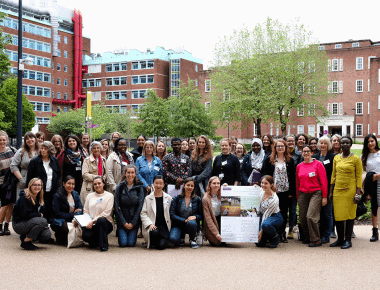Encouraging women voices in environmental science
Ecologist Dr Cecilia Medupin explains how engaging women from diverse backgrounds is a catalyst to environmental change.
Women and children are often the most vulnerable to environmental challenges, so it’s important that women’s voices are heard when we try to approach these problems. I created Women in Environmental Science (WiES) as a form of knowledge exchange that creates a space for environmental discussion among women from diverse backgrounds – both culturally and professionally. It brings together women from academia, industry, charities, students and members of the public who are interested in the environment.
WiES is part of Engaging Environments, a NERC-funded project that explores new approaches for researchers to engage the public with environment science. Very often ‘professionals’– those we perceive to have knowledge – only speak to other professionals. But I have come to see that for research to be inclusive and impactful, public engagement is very important. I draw on storytelling to communicate the work I am doing to diverse people in a way that they can connect to.
Two WiES workshops in 2018 and 2019 at University of Manchester were attended by more than 130 participants. Presenters came from various academic disciplines, the local community, policy and research organisations, including representatives from Institute of Environmental Management and Assessment, Chartered Institution of Water and Environmental Management, Earthwatch, Ignite Futures (Nottingham), Friends of the Earth, Manchester Community Choir, Community Perspectives, National Rail and environmental consulting firms.
The aim of the workshop was to promote inclusiveness, widen participation and foster discussion to help people understand the various aspects of environmental science, policy and application – while considering the role of women.
The talks and knowledge-exchange sessions addressed themes such as the empowerment of women, leadership, energy, climate change and education, health, and water, as well as the reflections of female leaders holding environmental roles in policy, academic research and industry.
The workshops and presentations were framed around the UN Sustainable Development Goals, enabling people to understand how the poor, vulnerable, and women are affected by environmental challenges, and how they can be empowered to sustainably use and protect available natural resources.
Importantly, the sessions were also about the women who attended – their backgrounds and personalities. These elements can’t be separated from a person’s work so, while I am talking about leadership and research impact, my plan is always to make them feel good about themselves, too. This enables the freedom for ideas to be discussed.
The complete blog can be accessed here.
Women and children are often the most vulnerable to environmental challenges, so it’s important that women’s voices are heard when we try to approach these problems. I created Women in Environmental Science (WiES) as a form of knowledge exchange that creates a space for environmental discussion among women from diverse backgrounds – both culturally and professionally. It brings together women from academia, industry, charities, students and members of the public who are interested in the environment.
WiES is part of Engaging Environments, a NERC-funded project that explores new approaches for researchers to engage the public with environment science. Very often ‘professionals’– those we perceive to have knowledge – only speak to other professionals. But I have come to see that for research to be inclusive and impactful, public engagement is very important. I draw on storytelling to communicate the work I am doing to diverse people in a way that they can connect to.
Two WiES workshops in 2018 and 2019 at University of Manchester were attended by more than 130 participants. Presenters came from various academic disciplines, the local community, policy and research organisations, including representatives from Institute of Environmental Management and Assessment, Chartered Institution of Water and Environmental Management, Earthwatch, Ignite Futures (Nottingham), Friends of the Earth, Manchester Community Choir, Community Perspectives, National Rail and environmental consulting firms.
The aim of the workshop was to promote inclusiveness, widen participation and foster discussion to help people understand the various aspects of environmental science, policy and application – while considering the role of women.
The talks and knowledge-exchange sessions addressed themes such as the empowerment of women, leadership, energy, climate change and education, health, and water, as well as the reflections of female leaders holding environmental roles in policy, academic research and industry.
The workshops and presentations were framed around the UN Sustainable Development Goals, enabling people to understand how the poor, vulnerable, and women are affected by environmental challenges, and how they can be empowered to sustainably use and protect available natural resources.
Importantly, the sessions were also about the women who attended – their backgrounds and personalities. These elements can’t be separated from a person’s work so, while I am talking about leadership and research impact, my plan is always to make them feel good about themselves, too. This enables the freedom for ideas to be discussed.
The complete blog can be accessed here.











